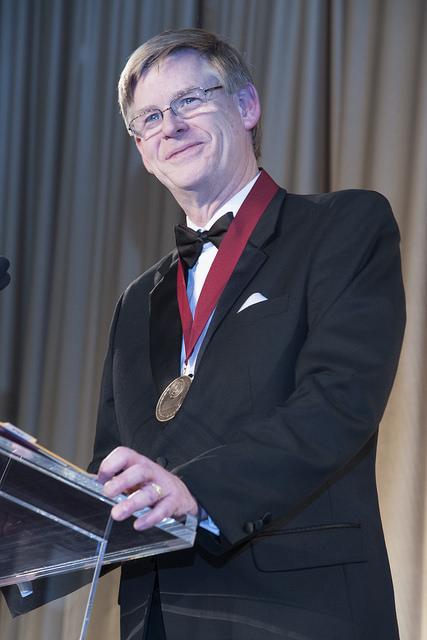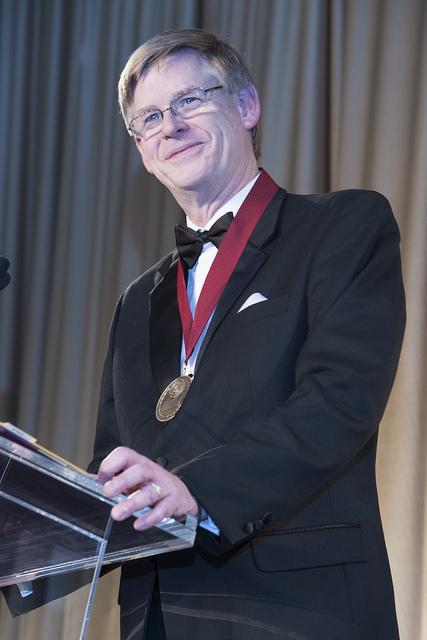
Credit: Loyola Medicine
MAYWOOD, IL – Patrick J. Stiff, MD, a world renowned cancer physician, researcher and teacher, has received the Stritch Medal, the highest honor given by Loyola University Chicago Stritch School of Medicine.
Dr. Stiff, director of Loyola Medicine's Cardinal Bernardin Cancer Center, has developed groundbreaking new treatments for leukemia and lymphoma and built one of the largest and most successful bone marrow transplant programs in the world.
The Stritch Medal recognizes outstanding accomplishments of a Loyola graduate or faculty member who exhibits dedication to research, education, and patient care.
"I can't think of anyone who deserves it more," said J. Paul O'Keefe, MD, chair of Loyola's Department of Medicine.
Dr. Stiff received the Stritch Medal during the medical school's 66th annual Awards Dinner Nov. 19 at the Hilton Chicago. Since 1950, the dinner has raised millions of dollars for medical education scholarships for Stritch students. It's the longest-running black tie gala in Chicago.
"It is an incredible honor to receive the Stritch Medal this year," Dr. Stiff said. "While my name is on the medal, I wish to share this honor with my family, for without them this award would not have been possible. I also accept it on behalf of the faculty and staff of the Cardinal Bernardin Cancer Center who each day singly and collectively hold our patients and their families as their number one priority."
Dr. Stiff is the Coleman Professor of Oncology at Stritch and medical director of the Cardinal Bernardin Cancer Center at Loyola University Medical Center. Dr. Stiff also is co-director of Loyola's Oncology Research Institute and division director of Hematology/Oncology.
Dr. Stiff earned his medical degree from Stritch School of Medicine in 1975. (Dr. Stiff's father, Philip Stiff, MD, also is a Stritch alumnus.) Dr. Stiff completed a residency in internal medicine at Cleveland Clinic Foundation and a fellowship in hematology and medical oncology at Memorial Sloan Kettering Cancer Center.
Dr. Stiff returned to Loyola in 1986 to lead its bone marrow transplant program. Bone marrow transplants treat leukemia, lymphoma and other blood cancers. The patient undergoes high-dose chemotherapy and possibly whole-body radiation to kill the cancer cells. While wiping out the cancer, the treatments also kill the patient's immune system cells so the patient receives an infusion of bone marrow cells, which develop into healthy new immune system cells.
"At Loyola, we provide outstanding care that also calms and comforts, envelopes and empathizes, supports and sustains, is gracious and good-hearted, respectful and reassuring and especially is spiritual and sustaining," said Dr. Stiff.
During his fellowship, Dr. Stiff developed a method for cryopreserving bone marrow cells, which has been used in tens of thousands of transplants around the world. Dr. Stiff performed and reported the first blood stem cell transplants, which have become the standard method of transplantation for leukemias and lymphomas. He also developed new drugs with reduced side effects.
Dr. Stiff performed the first successful transplants involving bone marrow cells that were collected from the patient or donor and then grown in a lab. He also led the first successful international study of expanding the number of cells from donated umbilical cord blood, which is an alternative to bone marrow transplants.
Under Dr. Stiff's leadership, Loyola brought clinical research programs to 10 community hospitals in Chicago's west and south suburbs. He organized a cancer research collaboration with the University of Notre Dame and chaired the SWOG Bone Marrow and Stem Cell Transplantation Committee.
Innovative new therapies offered at Loyola have expanded the number of patients who are being cured with bone marrow patients. One such patient was among the youngest to ever receive a bone marrow transplant, a 10-month-old girl with refractory leukemia. Today she is a college student training to become a nurse. Older patients also have benefitted. While the traditional cutoff age for bone marrow transplants is 60, Loyola now offers the treatment to patients in their 60s and 70s.
"Dr. Stiff changed the standard of care around the world," said Kathy S. Albain, MD, professor in Loyola's Department of Medicine, Division of Hematology/Oncology. "His technologies and advances are applied every day to patients with leukemia and lymphoma. He has done all this while being an outstanding clinician and a great teacher and mentor."
Dr. Stiff has five children and provided medical foster care to 28 children. "His devotion to family extends to other families," said his daughter Stephanie Stiff, APN, an advanced practice nurse at Loyola.
Dr. Stiff also leads an adventuresome life outside of medicine. He climbed to the top of Mount Kilimanjaro, the tallest mountain in Africa, hiked in a scorching desert in Jordan, camped near the North Pole in minus 20 degrees, and once climbed to the base camp of Mount Everest. And at age 61, he walked to the bottom of the Grand Canyon and climbed back up to the top – in a single day.
"I've always had an interest in exploring and discovering," Dr. Stiff said.
###
Media Contact
Jim Ritter
[email protected]
708-216-2445
@LoyolaHealth
http://www.luhs.org
############
Story Source: Materials provided by Scienmag





